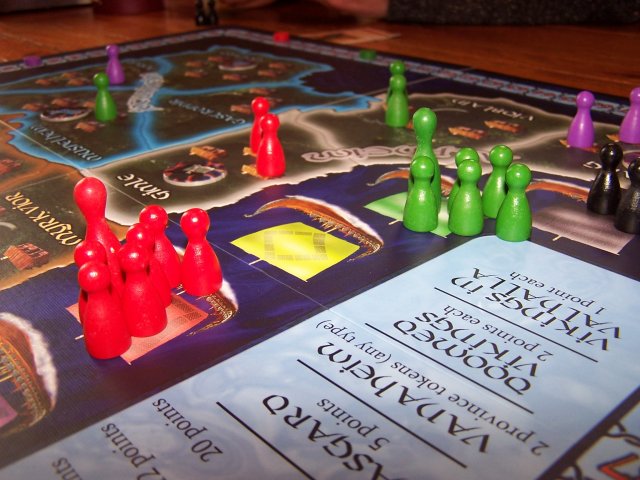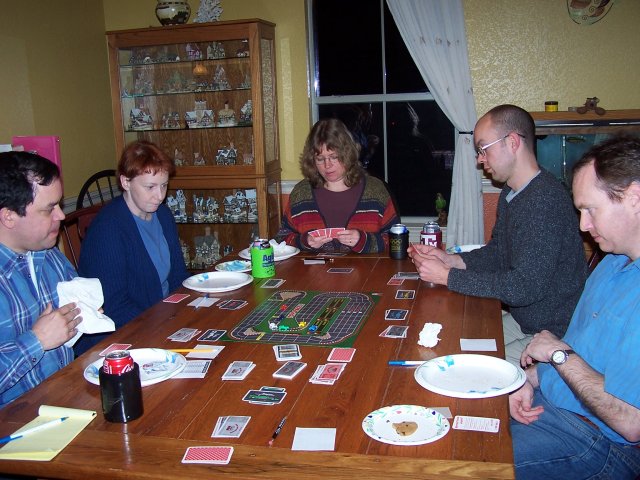
March 15, 2007Recent Gamingby Susan RozmiarekI've been too busy to write up reports for game sessions. Not that I've been to many lately. :-( So, I just thought that I'd comment on a few of the new-to-me games that I've played. MidgardA year or two ago pirates were all the rage while I was quite enchanted by the game Viking Fury. I was complaining then that there weren't enough Viking games. Now they seem to be falling everywhere from the sky. Here is another one I've played recently, following on the heels of the very enjoyable Walhalla. I was eager to try it, not just because of the Viking theme, but because it uses a nifty card drafting mechanism like that in Fairy Tale. It's not surprising that it is popping up in other games. I was kind of hoping it would, in fact. The first part of a round in Midgard consists of every player being dealt a hand of cards from three different stacks. The stacks are separated based on how powerful they are. Since everyone receives the same number of random cards from each stack, this ensures that the hands dealt are fairly even nicely mitigating some of the luck. Now each player chooses one of the cards to keep for their hand and passes the rest to his neighbor on the left. This is repeated until only one card is passed and everyone has their hand for the round.The second part of a round is just another area majority game. Yawn. I actually liked it however, because it felt a bit different than the usual thing I was expecting. Players are trying to place pawns (Vikings) on a map of Midgard and get majorities in the various regions. Cards from the players' hands drive the play and do various actions to achieve this. There are multiple ways to score. What's neat is that you can try getting immediate points at the end of a round, setting yourself up for even more points in future rounds (hardest to do, I thought), or trying for yet another way to score points at the end of the game, or a mix of all of those different ways. One of the biggest differences in the feel of the game from other area majority games was the constant turnover on the board. Protecting and holding majorities for long was very difficult as some of the cards have huge effects. Some players in our group thought it to be way too chaotic but I enjoyed trying to milk all the possible points I could each round with my hand of cards. There is a big advantage to going last in a round and here is where I do have a bit of a problem with the game. The person who is holding the most powerful card has to go first and then play goes in normal clockwise order so there is some randomness on who gets that last player advantage. Still, I found the game to be quite fun and I loved all the choices on which strategies to pursue. I chose not to go head-to-head with other players often over the region majorities during the game but rather just tried to have presence in certain regions. This allowed me to collect tokens. During the game, I fell way behind in points but my sets of collected tokens shot me out ahead for the win at the end of the game. Great fun! This game is now on our buy list. I was a little disappointed in the components. The Vikings are just wooden pawns and the art is just so-so. Top RaceThis is an older Wolfgang Kramer game that Paul has been bringing to our game days over and over without successfully getting it to the table. It kept getting lost under the avalanche of shiny new games to play. I'm glad he persisted in bringing it, because it's a fine car racing and betting game. I could see shades of similarities in other racing games that have been published since which is not surprising. Players get dealt a hand of cards that will be played to move the cars during the race. Then, they bid on which car they want to own, basing their decision on the cards they have been dealt. During the race, when the first car crosses certain checkpoints, players bet on which car they think will win. The earlier the checkpoint, the larger the payout is for correct predictions. At the end of each race, players get points for having their car place as well as for their correct bets. Since you often find yourself betting on other players' cars, you have to balance helping them as well as trying to get you own car to place. I enjoyed working out how to best use my hand of cards.QwirkleThis is like Ingenious but different. Now doesn't that tell you a whole lot? The first similarity is that the box is full of black tiles with pretty, colorful shapes on them. Qwirkle comes with 108 thick, square, painted wooden tiles. I was afraid they would get scratched up and marked, but so far the hard finish has held up well. Each tile depicts one of six shapes in one of six colors. Players have a hand of six tiles and place one or more on their turn to a grid and then drawing back up to six. Lines of tiles that all either share the same shape or the same color are created. Only one of each color can be added to a line sharing the same shape and only one of each shape can be added to a line sharing the same color. This means that a line can be a maximum of six tiles. On his turn, a player can add as many legal tiles to a single line as he wishes. The player then gets a point for each tile in any lines that he added to in his turn, including the ones that were already there. Clever placements often put in a tile in more than one line so the player can get points for multiple lines. In addition, a player gets a bonus of six points for placing the sixth tile in a line. If a player doesn't have a legal play or doesn't like his tiles, instead of placing tiles on his turn he can discard any number back to the pool and draw new ones. After all the tiles are drawn, play continues until a player places their last tile. That player gets a six point bonus and the game ends immediately.Ed thought that the end was too abrupt and that the round should be finished so that every player gets the same number of turns. I'd have to agree and we'll try that the next time we play. I thoroughly liked the game though. Finding the best placements seemed a little more challenging than in Ingenious but maybe that is because the game is still new to me. I have heard the game compared to Scrabble, of all things, but I don't really see it. I suspect that is because I'm a poor Scrabble player and I'm too focused on just trying to form a word, any word, rather than how to play the board. I wonder if Qwirkle would play well with partners like Ingenious? At any rate, it is my younger son's New Favorite Best Game Ever so we'll probably be playing it quite a bit more. AlchemistThis is a soon-to be-released (if it hasn't been already) game from Mayfair about collecting ingredients to make potions for points. I'm not quite sure what to make of it so far. It's short enough at 30-40 minutes to be a filler and it may end up being one of those games that pack a solid punch in a short time. The problem is, I can't decide yet how much control one truly has and whether or not there are different ways to approach the game. After three plays, the strategy seems a little scripted. This is highly irritating because I'm usually able to get a pretty solid opinion on a game after that many plays. There are a few clever mechanisms as well along with one that seems entirely unnecessary (drawing cubes from the bag for anybody who's played the game. This seemed an obvious choice on the first few turns and the bag was quickly emptied). Despite the neat theme and nice art, the game really just feels like shuffling cubes around though that doesn't necessarily bother me if the game play is decent. Give me some decent decisions and a few puzzles to solve and I'm happy, theme or no theme. Normally, I'm very forgiving of fillers. I can enjoy myself for 30 minutes even with just the illusion of depth in the game and so wouldn't be worrying over this one. However, this is a review copy that I plan to review so the game needs to be picked apart mercilessly until I come to a satisfactory conclusion. So before I say too much more, I need to get a few more plays in. Stay tuned. Posted by Susan Rozmiarek at March 15, 2007 1:14 PMComments
I am far less forgiving of Midgard than you. I found the game WAY too chaotic, with the board situation changing drastically with nearly every card played. Long-term strategies -- even short term strategies -- cannot be implemented due to this chaos. My feelings on Alchemist mirror your own. After three plays, I felt there was little control here, and victory ultimately went to the player who got lucky. This one headed out the door quick ... as did Midgard. Post a comment
This page viewed E-mail Ed Rozmiarek with questions or problems concerning this page. Copyright © 2007, Ed & Susan Rozmiarek. |

